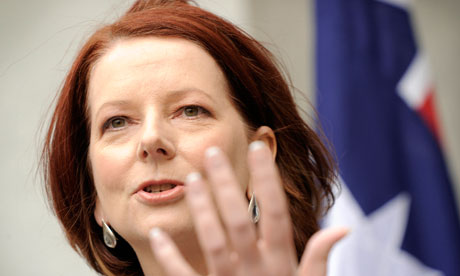Australia's government launched a third attempt on Thursday to make carbon polluters pay for their emissions, unveiling plans for a fixed-price scheme from 2012 and vowing not to surrender this time in the face of fierce opposition.
Prime minister Julia Gillard, whose predecessor, Kevin Rudd, stood down last year after two failed attempts to address climate change, said polluters would pay a yet-to-be-determined fixed price from July 2012, then move to a market-based system within five years.
"This is an essential economic reform, and it is the right thing to do," Gillard told a news conference, describing man-made climate as a national threat – just weeks after the country endured record floods and a massive cyclone.
"Can I make it very clear that in the debate that will ensue, I am not intending to take a backwards step," she added.
Australia, the world's biggest exporter of coal, is one of the highest per-capita carbon emitters in the rich world because of a reliance on coal for 80% of electricity generation.
The ruling Labor party came to power in 2007 vowing to cut carbon emissions, but its efforts foundered in parliament where it lacked sufficient support in the upper house Senate.
Gillard may yet succeed where Rudd failed. Thursday's framework deal already has the support of her minority government's political partners, including the Greens party that opposed the previous schemes for being too weak.
But crucial details, such as the actual starting price and the level of compensation to be paid to affected industries or households, have yet to be agreed with the Greens. Gillard said no decision had yet been made on any of these issues.
"This represents progress but there's disagreement in parliament about the level of ambition for the carbon price and that translates into uncertainty," said Deutsche Bank carbon analyst Tim Jordan.
"For any investor looking to take a long view on the carbon price, they need absolute clarity on the rules for the transition."
The plan, if passed by parliament, will place Australia among a small group of countries to put a national price on carbon dioxide, the main greenhouse gas blamed by scientists for causing global warming.
The European Union has a carbon trade scheme, as does New Zealand, while a regional scheme operates across 10 eastern US states. California has also approved an emissions trading scheme to start in 2012.
Some Australian electricity prices jumped after the announcement, but most futures contracts for 2012 were untraded, reflecting deep scepticism within the industry, which accounts for almost 40% of national emissions.
Electricity generators said the plan did nothing to encourage investment in the sector, while the coal industry warned about rushing to set a carbon price that would make the industry less competitive.
"The real worry for us is that what we've got is half an announcement and the really difficult half has yet to be negotiated," Australian Coal Association executive director Ralph Hillman told Reuters.

